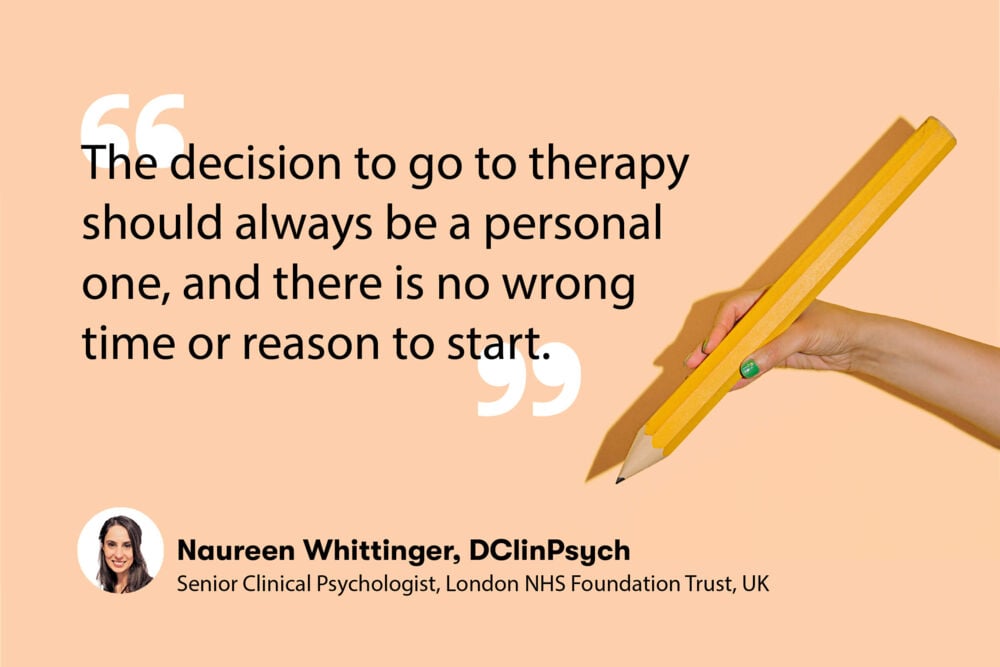Psychological therapy is a practice that aims to help people understand and manage difficulties in their life by talking with a trained professional. Learn from clinical psychologist Naureen Whittinger about signs that you might need professional help, the most common reasons people seek therapy, and how to find a psychotherapist that fits your needs.
-
Tracking cycle
-
Getting pregnant
-
Pregnancy
-
Help Center
-
Flo for Partners
-
Anonymous Mode
-
Flo app reviews
-
Flo Premium New
-
Secret Chats New
-
Symptom Checker New
-
Your cycle
-
Health 360°
-
Getting pregnant
-
Pregnancy
-
Being a mom
-
LGBTQ+
-
Quizzes
-
Ovulation calculator
-
hCG calculator
-
Pregnancy test calculator
-
Menstrual cycle calculator
-
Period calculator
-
Implantation calculator
-
Pregnancy weeks to months calculator
-
Pregnancy due date calculator
-
IVF and FET due date calculator
-
Due date calculator by ultrasound
-
Medical Affairs
-
Science & Research
-
Pass It On Project New
-
Privacy Portal
-
Press Center
-
Flo Accuracy
-
Careers
-
Contact Us
Signs You Need Psychotherapy and How to Choose the Right Therapist


Every piece of content at Flo Health adheres to the highest editorial standards for language, style, and medical accuracy. To learn what we do to deliver the best health and lifestyle insights to you, check out our content review principles.
Interview has been edited for clarity.
When is it time to make an appointment with a psychological therapist?
Dr. Whittinger says there are many reasons people seek the help of a psychotherapist. Some people go to therapy because they’re finding it difficult to manage their daily activities. Others are motivated by a change in mood or energy levels or in the way they respond to events.
“Key changes in mood to look out for are feeling very low or more irritable than usual, worrying excessively, or experiencing panic. Alternatively, your mood might be elevated, making it difficult to concentrate or rest,” says Dr. Whittinger.
“Your mood is linked closely with your physical well-being, so you might also notice changes in how you feel in your body — for example, not sleeping easily at night, feeling very tired even though you have rested, or changes in your eating patterns like losing your appetite or eating too much.”
She explains that the type of thoughts you have can point to your mental state. Things worth noting are racing thoughts, being preoccupied, difficulty concentrating, or finding it hard to notice anything positive.
Relationship changes can be another sign: being more easily upset by others, having frequent arguments, withdrawing from others, or being afraid of being alone.
Dr. Whittinger says that these signs are often normal reactions to difficult experiences. They may go away with time or with the support of friends and family. However, if problems like these persist for weeks, there’s no need to go through it alone.

“Therapy can provide a helpful space to talk and find new solutions. If you’re having serious thoughts about ending your life or are harming yourself, you should know there are people who can help you, and it can be crucial to seek professional support,” says Dr. Whittinger.
Take a quiz
Find out what you can do with our Health Assistant
What are some common difficulties people go to psychological therapy for?
Dr. Whittinger explains that people often begin therapy at times of intense stress, perhaps after a difficult event such as divorce, bereavement, or problems at work. Others begin because they are facing a dilemma in their life and they’re looking for a change.
Other people have wanted to go to therapy for a long time because they would like to better understand themselves.
“In life, people, especially women, experience a lot of pressure — to be perfect and to have the ideal relationship, family, career, and home, and never complain about anything,” says Dr. Whittinger.
“It’s no wonder many people experience depression and anxiety, have difficulty regulating their emotions, or use unhealthy coping mechanisms like addiction or self-harm. Therapy can provide a space to consider competing priorities and pressures, as well as relationship patterns that cause pain. It can also help people consider important decisions like when is the right time to start a relationship or a family, or how to move forward after the loss of someone close.”
Dr. Whittinger shares her professional experience: “As a psychological therapist, I notice some mental health concerns, such as eating disorders, are more commonly experienced by women, and there are conditions like postpartum depression and postpartum psychosis which are experienced solely by people who’ve had babies, so mostly women. Women are also more likely to experience gender-based crimes and go to therapy to discuss fertility, pregnancy, and childbirth.”
She says that the decision to go to therapy should always be a personal one, and there is no wrong time or reason to start.
How to choose a psychological therapist
Dr. Whittinger says that your family doctor or another health care professional can usually refer you to a psychological therapist.
This is a good way to find a therapist who is qualified, professional, and ethical. You can also find a therapist through recommendations from friends and family, through community or charity organizations, or from online registries.
“After you’ve identified a psychological therapist you might like to work with, the first step will be to find out more about how they work and if this fits with what you want,” says Dr. Whittinger. “If you are accessing therapy through health care professionals or other organizations, you might not be able to choose your therapist, but you can still ask questions about what to expect from therapy.”
If you have found a private therapist, Dr. Whittinger advises reading their website or giving them a call to find out more. Ask about the time, place, length of sessions, and how long therapy might last. Make sure you are clear about the costs and any charges for missed appointments and holidays.
“Whoever you choose to work with, you should always ensure that they have the appropriate qualifications to work with you and are registered with a professional body. Your therapist should be able to explain more about how they work so you can be better prepared for your first session,” says Dr. Whittinger.
How to decide if they’re the right therapist for you
Dr. Whittinger says that a good fit is important, so ask yourself if your therapist is someone you feel comfortable sharing your thoughts and feelings with.
For some people, starting therapy can be tough or feel strange, but it’s important to tell your therapist if there’s anything you don’t understand about the process or don’t feel comfortable with in the sessions.
If you've already made an appointment with a therapist, don't miss this first-time therapy session guide by Dr. Whittinger.


Hey, I'm Anique
I started using Flo app to track my period and ovulation because we wanted to have a baby.


The Flo app helped me learn about my body and spot ovulation signs during our conception journey.


I vividly
remember the day
that we switched
Flo into
Pregnancy Mode — it was
such a special
moment.
Real stories, real results
Learn how the Flo app became an amazing cheerleader for us on our conception journey.




